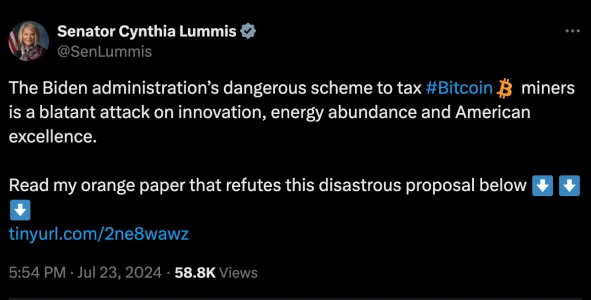
- Cynthia Lummis thinks the Biden administration’s proposed 30% tax on electricity for Bitcoin miners is a bad idea that could hurt the industry.
- China banned Bitcoin mining in 2021, and America quickly became a global leader in it.
- The proposed tax could push Bitcoin mining operations overseas and harm America’s energy grid and economic growth.
Senator Cynthia Lummis isn’t happy with the Biden administration’s idea of slapping a 30% tax on the electricity Bitcoin miners use.
She says this move could mess up America’s booming Bitcoin mining industry, which took off after China banned Bitcoin mining.
China was the big player in Bitcoin mining until the Chinese Communist Party (CCP) pulled the plug in 2021. They banned Bitcoin mining, opening the door for the U.S. to become the new leader.
With America’s solid energy market and rule of law, it quickly attracted big investments and top talent in the Bitcoin mining field.
The Threat Of The 30% Excise Tax
Fast forward a few years, and America is now the home base for many large Bitcoin mining companies. But this new tax proposed by the Biden administration could change all that.
Cynthia thinks that this tax could push the industry out of the country and into the arms of other nations. She also thinks the Treasury’s reasons for the tax are based on outdated views on energy use and technology.

With her report, Cynthia wants to clear up the myths behind the tax proposal. She highlights the economic and energy benefits Bitcoin mining brings, like creating jobs, supporting energy infrastructure, and driving innovation.
She believes this tax would damage these benefits and hurt a growing sector of the American economy. She took the time to explain how the blockchain works and how exactly Bitcoin mining happens.
Since Bitcoin’s start in 2009, mining has gone from home computers to large-scale operations. With cheap, reliable energy, strong property rights, and respect for the law, the U.S. became a prime location for mining. Cynthia said:
“Bitcoin miners are lawful American businesses that pay standard taxes and bring significant economic benefits to underserved areas.”
Even if the administration’s goals are valid, Cynthia thinks the tax could backfire. She calls it a poorly designed policy that could harm the very objectives it aims to achieve.
The administration claims Bitcoin mining risks local utilities’ grid operations but offers no evidence. Studies show Bitcoin mining actually strengthens energy grids.
Bitcoin miners act as flexible loads that help balance energy grids. They can adjust their energy use based on supply and demand, so blackouts and disruptions are not a risk.
The Bitcoin Mining Council reported in August 2023 that available interruptible load from Bitcoin miners is about 25% of all installed utility battery storage in the U.S. and Canada, and it’s growing.
Research also shows Bitcoin mining can restore balance to a grid after a disaster. Studies from 2023 suggest Bitcoin mining is ten times better than existing technology for returning a grid to the proper frequency during a crisis.
Cynthia finished her report saying, “If America fails to create a supportive and stable environment for Bitcoin mining, we risk squandering the advantages we currently enjoy and may find ourselves playing catch-up in a race we once had every opportunity to lead.”















